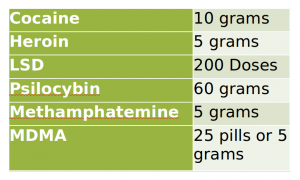Beginning of the End?
On Thursday, July 6, 2017, Oregon Legislature passed two bills that could be the beginning of the end of the “War on Drugs”. Will Oregon start the beginning of the end of the ““War on Drugs”?” I think so. Here is why.
The Gain Isn’t Drugs, It’s Equality
After reading an article on the issue and the referenced bills in full, it was shocking to me that the initial article did not mention nearly a fraction of what these laws if enacted, will mean. It seems to focus on the decriminalization of hard drugs and reduction in sentences. But that’s not what strikes me.
Not only do these bills decriminalize possession and personal use of six “hard” drugs, but they also address and attempt to start rectifying the disproportionate impact the “War on Drugs” has had and continues to have on minority communities.
The “War on Drugs” has proven time and time again lack benefit. It has no impact on drug addiction rates. It only tears apart families, ruins lives, and creates a social and racial divide within our society.
The end of the “War on Drugs” would be the end of seeing addiction as a moral issue. It would then be treated as public health issue, not a crime. It would allow more funding for education, rehabilitation, and treatment of addiction (including medication assisted treatment, especially for opioid treatment) and those inflected with it. And, as mentioned above, it could be the start of making law enforcement accountable for any and all profiling.
So what are these Bills? And how might other States draft similar legislation?
House Bill 2355
The first bill to be passed was House Bill 2355. HB 2355 will decriminalize personal use and possession of cocaine, heroin, LSD, Psilocybin, and methamphetamine. It also reduces possession of methadone or oxycodone to misdemeanors. This allows users to possess a certain amount of the drug to be used for “personal use.” Being caught with this will only result in a misdemeanor.
The personal use thresholds are below.
The second part of HB 2355 Oregon’s Criminal Justice Commission is an act that will develop a method to capture, analyze, and report all data from law enforcement agencies concerning officer-initiated/involved pedestrian and traffic stops. This data will then be used to identify patterns of profiling.
The data to be collected is proposed to be the following:
(a) The date and time of the stop;
(b) The location of the stop;
(c) The race, ethnicity, age, and sex of the pedestrian or the operator of the motor vehicle stopped, based on the observations of the law enforcement officer responsible for reporting the stop;
(d) The nature of, and the statutory citation for, the alleged traffic violation, or other alleged violation that caused the stop to be made
Decriminalization of substances and the start of law enforcement accountability in regards to profiling is a large step towards righting many wrongs that the “War on Drugs” has created. So, this Bill gets my full backing.
House Bill 3078
The second bill heading to the governor’s desk will make just as much of an impact. This bill is HB 3078. Known as the safety and savings act, this bill, if passed, will attempt to continue the already progressive prison reform advocacy and expand programs already in place to accommodate more offenders. The act is hoping focus is less on sentencing and more on rehabilitation. It proposes giving certain individuals, convicted of drug and property crimes, addiction treatment and community supervision instead of long prison sentences.
HB 3078 supporters point out that the current drug and property laws disproportionately impact women and people of color. If passed, the bill could prevent a second women’s prison from opening and fix Oregon’s already put-in-place Family Services Act (FSA) that allows parents of children to remain within the home instead of possibly damaging the lives of many others by giving the offender a lengthy prison sentence.
Another aspect of the bill is extending the current Family Services Act (FSA) which allows offenders who are parents of children to remain in their homes and provides intensive supervision and services to the offender and their family.
What’s Next?
Both house bills 2355 and 3078 are ready to be signed into law. The next step is for Governor of Oregon Kate Brown to review the bills and decide to either Sign, Veto, or do nothing. After reading over Kate’s “On The Issues” page, I have full confidence that both of these bills will be passed and put into law after leaving her desk.
The “War on Drugs” needs to come to an end. Not every hero wears capes. Some are great politicians fighting for equality. Hats off to you, Oregon, and to everyone who worked in pushing that bill to the top.









